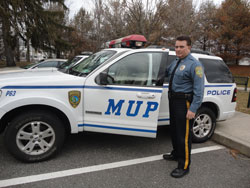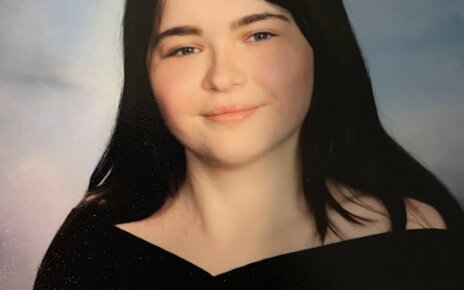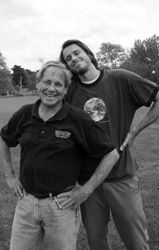Numerous unplanned occurrences can find themselves wedged between the everyday obligations of a police officer at the University; A suspicious persons report, card access failure, and a fender bender in the parking lot happened last Thursday evening when Patrolman John Noonan was on duty.
The night shift began with a briefing, the way every shift change begins at the University Police Department. The other officers on duty for the night shift on Thursday, February 21 were Patrolman Stephen Pavich and Safety Officer Frank Lotorto.
The officers sat in the squad room and discussed what had happened during the previous shift and reviewed any teletypes. A “teletype” is a notification sent over from another police department for them to be conscious of. In this instance, they had received a teletype about a missing persons report, a girl from a community campus nearby.
“We’re here to make sure that everything goes smoothly and that everybody is safe. That’s the most important thing,” said Noonan. He has worked for the University for ten years. Previously, he worked in Maplewood Township for 28 years as a Detective Lieutenant/Commander of the Detective Bureau. “It’s a secure, steady job and I like helping people. I actually took a cut in pay to be a cop,” he said. Prior to becoming a police officer, Noonan had a managerial position at Kings Super Market.
Paperwork and documentation is a big part of the job. Noonan said, “There’s a report for everything.” Officers must constantly document the status of their car (mileage, contents of the car, etc.) as well as their stops (if the buildings checked “okay”).
Noonan said, “They (the students) should feel safe here because they do have a police department. A lot of colleges don’t have a paid police department that are armed.”
According to stateuniversity.com, Monmouth University ranked as the fifth safest campus in New Jersey in 2011 and 2012 with a score of 91.72 out of 100. The top three safest campuses were community colleges with no dormitories, and William Paterson University of New Jersey took the number four spot.
Noonan also said he feels that campus police can intimidate the students. He said, “We’re not here to hurt them, we’re here to help them. And we’re all in this together, we all have this little township and we all have to get along.”
Throughout the night the radio picked up other police station frequencies. There was a bank robbery in Colts Necks and details of the robbery and suspect were constantly reported over the radio. MUPD works closely with the local police departments and will help them on calls when needed. “One night they had a shooting in Long Branch at a bar and they sent me over because they needed cops,” said Noonan.
The officers typically work in eight-hour shifts, five days a week. “We take our jobs very seriously. I think of the kids here as my kids, I treat them as if they were my kids and I think when you have that frame of mind you’re going to extend yourself a little bit more for them,” said Noonan.
There are usually three to four police officers on duty at a time and they each have an assigned “post,” a specific section of campus. There are three posts total.
The most common crimes found at the University are underage drinking and narcotics. Resident’s assistants or neighbors, rather than the police coming across them, call in most incidents. Noonan explained one of the biggest misconceptions about MUPD. “I know I’ve heard that some kids think that we’re just security, and that’s far from the truth,” he said.
The team is comprised of career and retired officers. A career officer means they were put through the police academy by the University. A retired officer has previously gone through the academy separately from the University and worked at another police department. The University currently only hires retired officers.
There is also a two-man detective bureau, Detective Corporal Jeff Layton and Detective Sergeant Ken Kennedy, responsible for the following up of investigations and keeping property and contraband as well as keeping control of the fire alarms and cameras on campus. Layton has worked at the University for six years. Previously, Layton worked as a police officer in Ocean Township for 25 years. He said, “I switched (to detective) because I like the follow up work. It gave me a chance to do more than just take a report. You can get involved in a case in the beginning and follow it through the end.”
About two hours into the shift, the car was called to President Gaffney’s house for a suspicious persons call. The suspect appeared to be a “lookout,” a person that the University was alerted to be conscious of. The premises and surrounding side streets were searched and the officers came to the conclusion that she had left campus. It was suggested that because the gates to the driveway were open and many of the lights were on that she thought it was a University event that was open to the public.
A fender bender in the library parking lot delayed the closing of the academic buildings, but Noonan was able to finish the job. Anything not finished in one shift rolls over to the officer in the following shift. Every night, the officer’s check, lock, and secure all academic and residential buildings on campus.
Last fall semester, the MUPD began taking students as interns. “We normally get a letter from the Criminal Justice Department about a student interested in interning with us. We tried it once and it went well, so it is something we are going to continue to do,” said Chief of Police William McElrath.
All of the officers of the University Police Department stressed that the safety of students is their biggest concern. Noonan said, “No complaints about the kids here. All in all they’re just kids in college. As long as at the end of the night, everyone is safe in their beds.”
PHOTO TAKEN by Alexis Orlacchio




